HR Associates play a fundamental role in shaping the workforce of a company. They ensure that the organization not only attracts but also retains and nurtures top talent across various departments.
Key skills for an HR Associate include a strong grasp of employment laws, proficiency in payroll management, and effective interpersonal and communication abilities. These skills help them manage recruitment processes, employee relations, and benefits administration efficiently.
Candidates can write these abilities in their resumes, but you can’t verify them without on-the-job HR Associate skill tests.
In this post, we will explore 9 essential HR Associate skills, 11 secondary skills and how to assess them so you can make informed hiring decisions.
Table of contents
9 fundamental HR Associate skills and traits
The best skills for HR Associates include Communication, Recruitment, Employee Relations, Compliance, Onboarding, Payroll Management, Performance Management, HR Software and Conflict Resolution.
Let’s dive into the details by examining the 9 essential skills of a HR Associate.
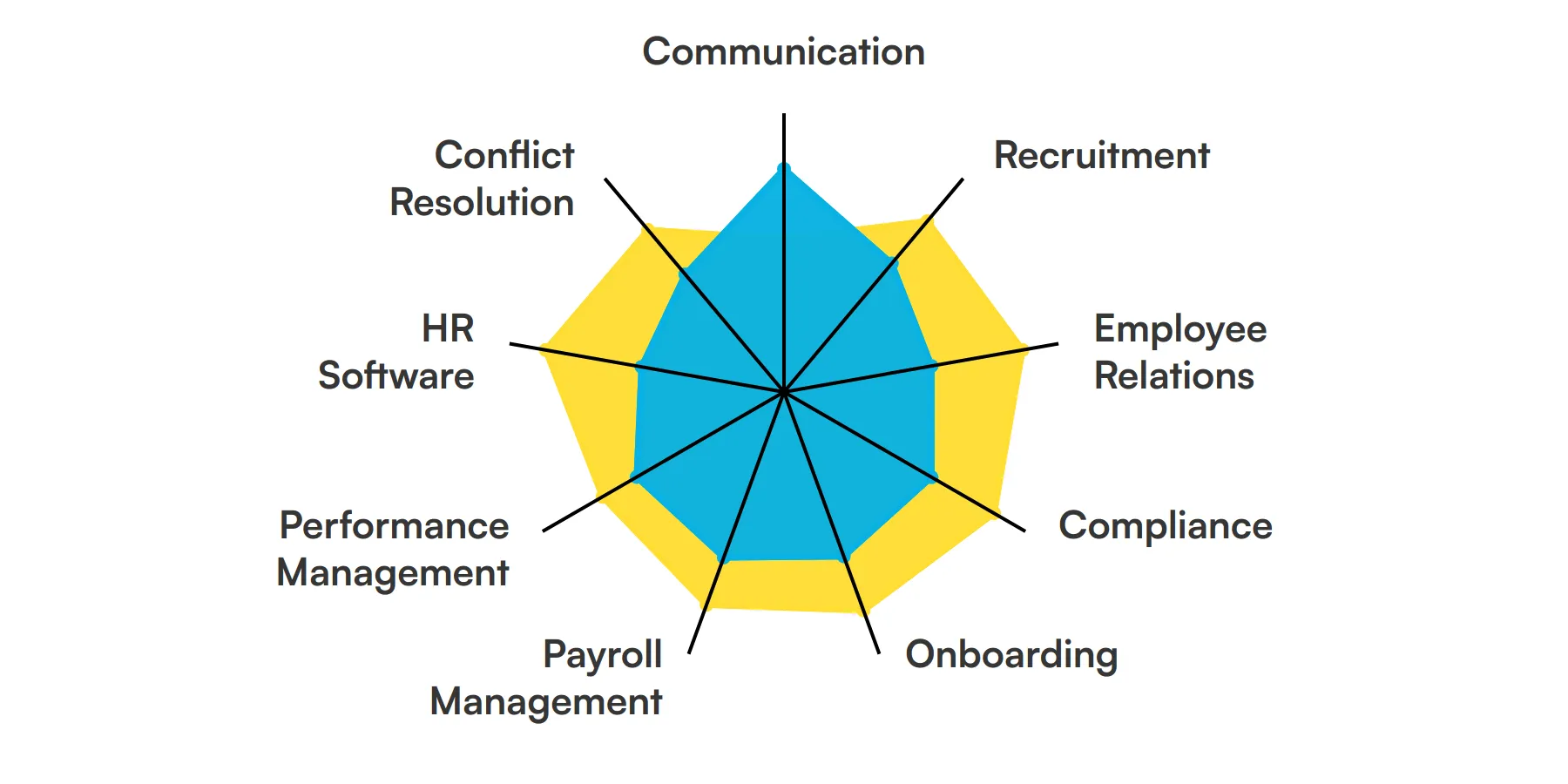
Communication
An HR Associate must excel in both verbal and written communication. This skill is crucial for conducting interviews, explaining company policies, and resolving conflicts. Clear communication ensures that all parties understand expectations and procedures.
Check out our guide for a comprehensive list of interview questions.
Recruitment
Recruitment involves sourcing, screening, and selecting candidates for job openings. An HR Associate uses this skill to identify the best talent for the company, ensuring that the hiring process is smooth and effective.
Employee Relations
Managing employee relations involves addressing concerns, mediating disputes, and fostering a positive work environment. This skill helps HR Associates maintain a harmonious workplace, which is essential for employee satisfaction and productivity.
Compliance
Compliance knowledge ensures that the company adheres to labor laws and regulations. An HR Associate must stay updated on legal requirements to avoid potential legal issues and ensure fair treatment of employees.
Onboarding
Onboarding is the process of integrating new hires into the company. An HR Associate uses this skill to ensure that new employees are well-informed about their roles, company culture, and policies, which helps them settle in quickly and effectively.
Payroll Management
Handling payroll involves calculating wages, managing deductions, and ensuring timely payments. An HR Associate must be meticulous in payroll management to maintain employee trust and comply with financial regulations.
For more insights, check out our guide to writing a Payroll Director Job Description.
Performance Management
Performance management includes setting goals, conducting evaluations, and providing feedback. This skill helps HR Associates ensure that employees are meeting their objectives and contributing to the company's success.
HR Software
Proficiency in HR software is essential for managing employee data, tracking performance, and automating HR processes. An HR Associate uses these tools to streamline operations and improve efficiency.
Conflict Resolution
Conflict resolution involves addressing and resolving workplace disputes. An HR Associate must be adept at mediating conflicts to maintain a positive and productive work environment.
11 secondary HR Associate skills and traits
The best skills for HR Associates include Data Analysis, Training and Development, Time Management, Negotiation, Cultural Awareness, Project Management, Emotional Intelligence, Networking, Adaptability, Attention to Detail and Customer Service.
Let’s dive into the details by examining the 11 secondary skills of a HR Associate.
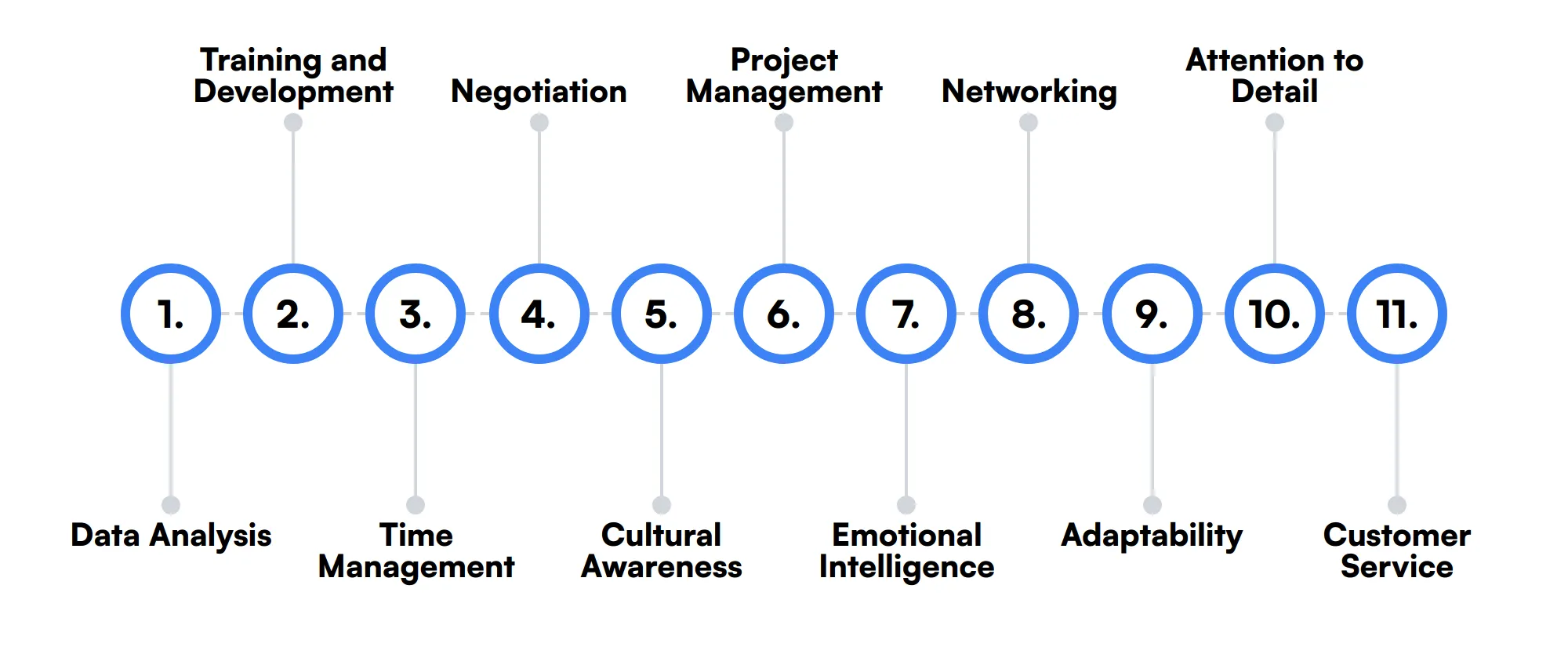
Data Analysis
Data analysis skills help HR Associates interpret employee data and make informed decisions. This can include analyzing turnover rates, employee satisfaction surveys, and other metrics to improve HR strategies.
Training and Development
This skill involves creating and implementing training programs to enhance employee skills and knowledge. HR Associates use this to ensure that the workforce is continuously improving and adapting to new challenges.
Time Management
Effective time management allows HR Associates to juggle multiple tasks and deadlines efficiently. This skill is important for managing recruitment, onboarding, and other HR responsibilities without delays.
Negotiation
Negotiation skills are useful for discussing salaries, benefits, and resolving conflicts. An HR Associate often negotiates terms with candidates and employees to reach mutually beneficial agreements.
Cultural Awareness
Understanding and respecting diverse cultures is important in a globalized workplace. HR Associates use this skill to create inclusive policies and practices that cater to a diverse workforce.
Project Management
Project management skills help HR Associates plan, execute, and oversee HR projects. This can include implementing new HR software, organizing training sessions, or rolling out new policies.
Emotional Intelligence
Emotional intelligence involves understanding and managing one's own emotions and those of others. HR Associates use this skill to handle sensitive situations and build strong relationships with employees.
Networking
Networking skills help HR Associates build professional relationships within and outside the organization. This can be useful for recruitment, staying updated on industry trends, and finding new opportunities for collaboration.
Adaptability
Adaptability is the ability to adjust to new conditions and changes in the workplace. HR Associates need this skill to handle evolving HR practices, technologies, and organizational changes.
Attention to Detail
Attention to detail is crucial for tasks like reviewing resumes, managing employee records, and ensuring compliance. HR Associates must be meticulous to avoid errors and maintain accurate records.
Customer Service
Customer service skills are important for addressing employee inquiries and concerns. HR Associates use this skill to provide support and ensure a positive experience for all employees.
How to assess HR Associate skills and traits
Assessing the skills and traits of HR Associates is a critical step in ensuring your HR team is effective and capable. While the resume might highlight their past experiences and qualifications, it doesn't provide a clear insight into their practical abilities in areas such as communication, recruitment, and compliance.
To truly understand whether a candidate will thrive in your organization, implementing a structured assessment process is key. This can range from behavioral interviews to practical tasks that reflect real-life HR scenarios. For instance, role-playing exercises can help evaluate proficiency in conflict resolution and employee relations.
Moreover, using specialized assessment tools can significantly streamline the hiring process. Adaface assessments, for example, offer a tailored approach to evaluating the core competencies of HR professionals, from payroll management to performance management. By integrating these assessments, companies have reported an 85% reduction in screening time. Learn more about how Adaface can enhance your hiring process here.
Let’s look at how to assess HR Associate skills with these 4 talent assessments.
Communication Skills Test
The Communication Skills Test evaluates candidates' communication skills, including verbal and written communication, active listening, and interpersonal skills. It assesses their ability to effectively communicate with customers, colleagues, and stakeholders in various professional scenarios.
The test covers communication skills, situational judgement, attention to detail, critical thinking, and verbal reasoning. Candidates navigate through situational judgement MCQs, communication skills MCQs, critical thinking MCQs, and verbal reasoning MCQs.
Successful candidates demonstrate strong verbal and written communication, active listening, and the ability to handle professional scenarios effectively.
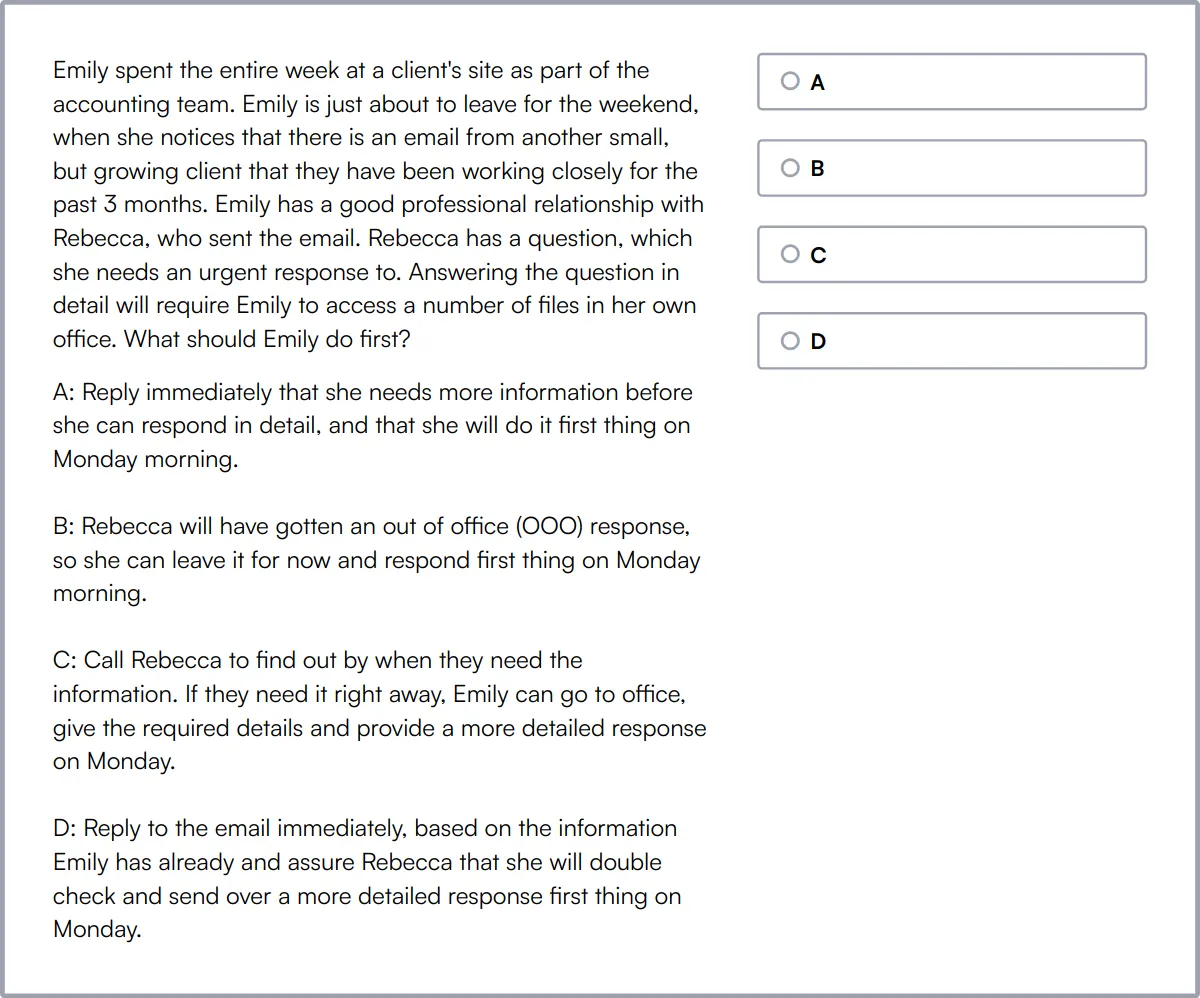
Talent Acquisition Test
The Talent Acquisition Test measures a candidate's proficiency in sourcing, recruiting, and onboarding qualified individuals. It also evaluates their skill in leveraging recruitment technologies and data analysis to fulfill the organization's human capital needs.
The test assesses logical reasoning, situational judgement, evaluation, interviewing, selection, candidate screening, skills assessment, job analysis, and job descriptions. Candidates answer talent acquisition MCQs, logical reasoning MCQs, and situational judgement MCQs.
High-scoring candidates show strong abilities in sourcing and recruiting, as well as effective use of recruitment technologies and data analysis.
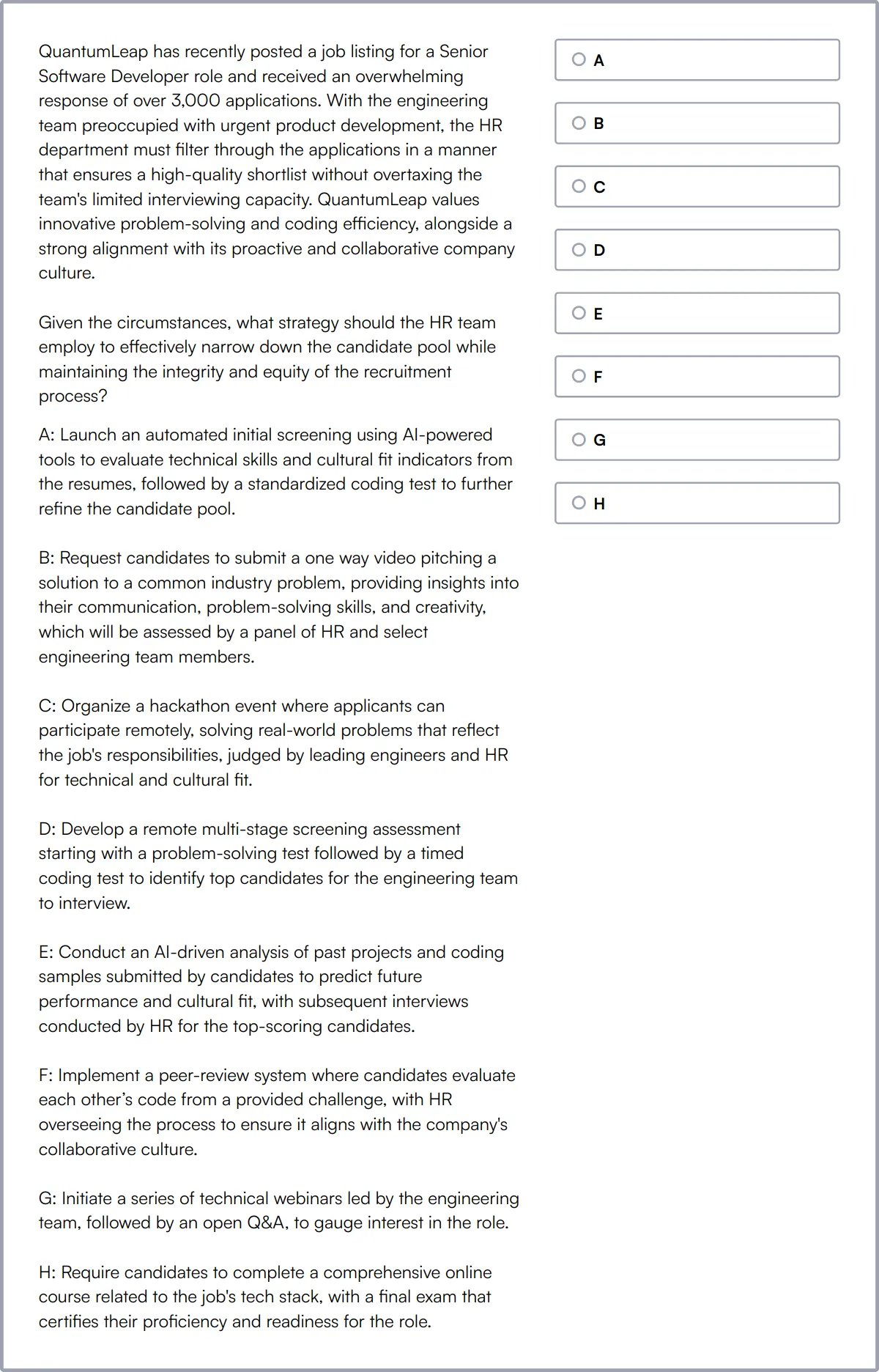
GDPR Online Test
The GDPR Online Test uses scenario-based MCQs to evaluate candidates on their understanding of GDPR regulations and best practices for data protection and privacy. It assesses their ability to identify and evaluate data protection risks and develop GDPR compliance policies.
The test covers data privacy, data protection, data security, data breach, data processing, consent management, data retention, data subject rights, data transfer, data controllers, and data processors. Candidates answer GDPR MCQs.
Successful candidates demonstrate a strong understanding of GDPR regulations and the ability to implement effective data protection and privacy policies.
HR Test
The HR Test evaluates a candidate's ability to address common workplace challenges in staffing, aligning employee behavior with business goals, and utilizing HR software to support management and staff.
The test covers human resource management fundamentals, talent acquisition fundamentals, critical thinking, abstract reasoning, situational judgement, conflict management, and talent pipeline management. Candidates answer talent acquisition MCQs, human resource management MCQs, critical thinking MCQs, and abstract reasoning MCQs.
High-scoring candidates show strong HR management skills, effective conflict management, and the ability to align employee behavior with business goals.
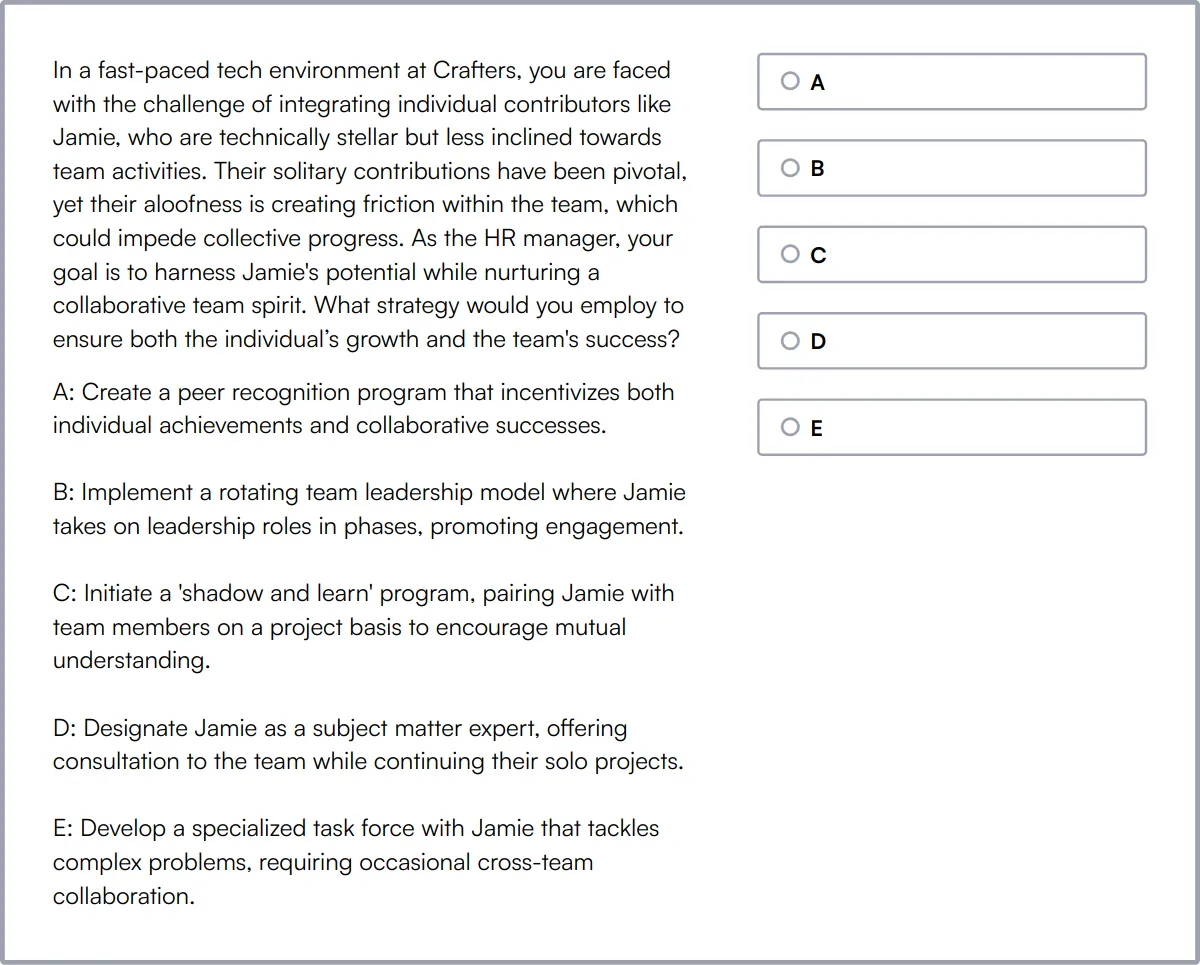
Summary: The 9 key HR Associate skills and how to test for them
| HR Associate skill | How to assess them |
|---|---|
| 1. Communication | Evaluate clarity and effectiveness in verbal and written interactions. |
| 2. Recruitment | Assess ability to identify and attract suitable candidates. |
| 3. Employee Relations | Gauge skill in managing and resolving workplace issues. |
| 4. Compliance | Check knowledge of labor laws and company policies. |
| 5. Onboarding | Review process for integrating new hires into the organization. |
| 6. Payroll Management | Examine accuracy and timeliness in handling payroll tasks. |
| 7. Performance Management | Evaluate methods for assessing and improving employee performance. |
| 8. HR Software | Test proficiency in using HR management systems. |
| 9. Conflict Resolution | Assess ability to mediate and resolve disputes. |
Customer Success Test
HR Associate skills FAQs
What are the key communication skills for an HR Associate?
HR Associates need strong verbal and written communication skills to interact with employees, management, and job candidates. They should be able to convey information clearly and listen actively.
How can recruiters assess recruitment skills in HR Associates?
Recruiters can evaluate recruitment skills by reviewing the candidate's experience with sourcing, interviewing, and hiring processes. Role-playing scenarios and asking about past hiring successes can also be insightful.
Why is employee relations important for an HR Associate?
Employee relations help maintain a positive work environment. HR Associates manage conflicts, address grievances, and ensure that employees feel valued and heard.
What methods can be used to assess compliance knowledge in HR Associates?
Assess compliance knowledge by asking about their familiarity with labor laws, company policies, and regulatory requirements. Scenario-based questions can also help gauge their understanding.
How do HR Associates contribute to onboarding?
HR Associates facilitate the onboarding process by preparing documentation, conducting orientation sessions, and ensuring new hires are integrated smoothly into the company culture.
What tools are commonly used for payroll management in HR roles?
Common tools include payroll software like ADP, Paychex, and QuickBooks. Familiarity with these tools ensures accurate and timely payroll processing.
How can data analysis skills benefit an HR Associate?
Data analysis helps HR Associates make informed decisions by interpreting employee data, tracking performance metrics, and identifying trends that can improve HR strategies.
What is the role of emotional intelligence in HR?
Emotional intelligence allows HR Associates to manage their own emotions and understand others' emotions, fostering better relationships and resolving conflicts effectively.
Assess and hire the best HR Associates with Adaface
Assessing and finding the best HR Associate is quick and easy when you use talent assessments. You can check out our product tour, sign up for our free plan to see talent assessments in action or view the demo here:

40 min skill tests.
No trick questions.
Accurate shortlisting.
We make it easy for you to find the best candidates in your pipeline with a 40 min skills test.
Try for freeRelated posts
Free resources



